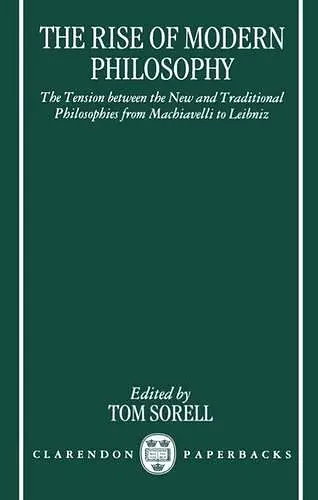The Rise of Modern Philosophy
The Tension between the New and Traditional Philosophies from Machiavelli to Leibniz
Format:Paperback
Publisher:Oxford University Press
Published:9th Nov '95
Currently unavailable, and unfortunately no date known when it will be back

`Modern' philosophy in the West is said to have begun with Bacon and Descartes. Their methodological and metaphysical writings, in conjunction with the discoveries that marked the seventeenth-century scientific revolution, are supposed to have interred both Aristotelian and scholastic science and the philosophy that supported it. But did the new or `modern' philosophy effect a complete break with what preceded it? Were Bacon and Descartes untainted by scholastic influences? The theme of this book is that the new and traditional philosophies have more in common than the orthodox account suggests. In two survey articles and thirteen essays on individual philosophers, the contributors show that the rise of modern philosophy was much more complicated and much more interesting than is usually thought. They consider not only metaphysics and the sciences but also claims of Machievelli, Hobbes and Spinoza to have invented `modern' ethics and politics. These two aspects of `modernity' in philosophy are connected for the first time. The book offers a broad view of the early modern philosophers, covering not only the much-studied major figures but also relatively neglected writers: Mersenne, Gassendi, White, and Sergeant.
Fascinating mixtures of old and new philosophy as there may have been, these do not challenge the need for a dividingline. In fact, I think there are indications of a definite shift which can be discerned in nearly all contributions to The Rise of Modern Philosophy * Archiv Für Geschichte der Philosophie *
ISBN: 9780198236054
Dimensions: 216mm x 138mm x 22mm
Weight: 478g
362 pages